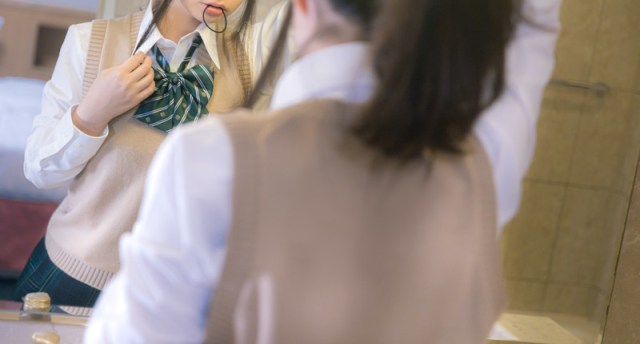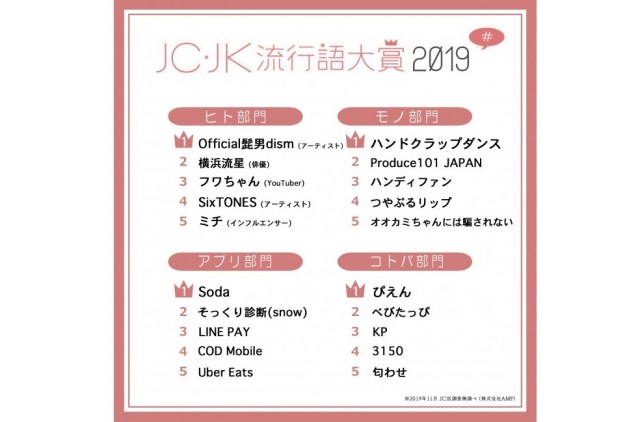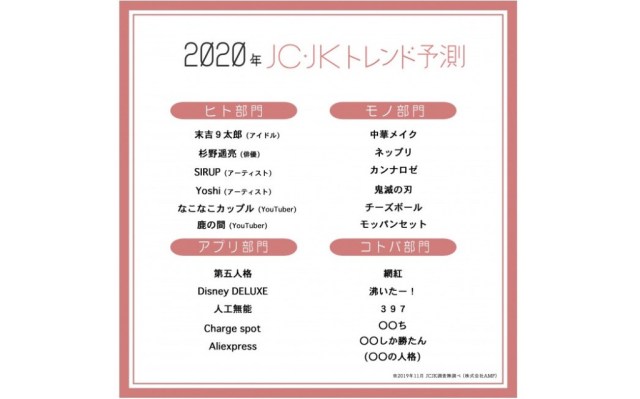
Find out this year’s trendiest slang for Japanese female teenagers and you’ll be grouped in the cool crowd while strutting the streets of Shibuya.
It seems that young women have always played a pivotal role in popularizing new slang and influencing linguistic trends throughout modern Japanese history. Sometimes these new language forms are inaccessible to those even just 10 years older, who are then left scratching their heads and wondering if what they heard is actually a foreign language.
We previously shared the nominees for the 2019 top buzzwords in Japan, but today, let’s take a look at the 2019 Buzzword Awards as chosen by none other than Japanese JC (slang for “joshi chugakusei”, which translates to “junior high school girls”) and JK (slang for “joshi kosei”, which translates to “senior high school girls”). The top selections were voted on by a team of female students at AMF (“Appreciation, Modesty, Full Power”), a company established in 2013 by then 15-year-old Rika Shiiki whose goal is to conduct independent networking, research, and marketing into the trends of Japanese female junior high school and high school students while at the same time introducing cute JC & JK trends worldwide. The selected buzzwords were arranged and ranked within the four separate categories of People, Things, Apps, and Language.
Without further ado, let’s introduce the top buzzwords in each category before they become obsolete!
▼ JC & JK Buzzword Awards 2019 / JC・JK流行語大賞2019
People category: Official Hige Dandism / Official 髭男dism
Called “Higedan” for short, this four-member male band is extremely popular among Japanese junior and senior high school girls. They gained immense popularity through YouTube and other subscription-based services for their catchy melodies and lyrics, not to mention wholesome music videos.
▼ The song “Pretender” became a mega-hit in April 2019.
Things category: HandClap dance / ハンドクラップダンス
Set to the song “HandClap” by Fitz and the Tantrums, this dance refers to a workout choreographed by two Korean YouTubers that’s said to help you lose 10 kilograms (22 pounds) in the span of two weeks. With its quick movements, simple gestures, and upbeat tune, the routine has become a popular selection for Cultural Festivals and Sports Days held annually at schools throughout Japan.
▼ Just try watching this video without moving your hands at all!
Apps category: Soda / SODA
Soda is a very common camera app used especially by female students that provides instant styling, makeup, and beauty enhancement filters at the moment a photo is taken. Among young Japanese women, there’s a kind tacit agreement that you will always, always take photos of each other through Soda and not through your regular phone camera…
▼ A comparison of three different photo apps. The second photo uses Soda.
https://twitter.com/ao_ao_xxx/status/1201717195333464064Language category: Pien / ぴえん
Pien is a shortened form of pieeen, which is internet slang for a crying sound that you make when something unfortunate has happened. It’s often used throughout social media at the end of a sentence and in tandem with a sad emoji.
▼ Sample tweet: “Good night, everyone!! Pien. Vacation is over…”
みんなおやすみだよ‼️:;(∩´﹏`∩);:ぴえん
— まお⚔️いのりまち町民🍀 (@J0MHHRRCoC7MT7a) December 8, 2019
休みが終わっちゃうよ.......(;A;) pic.twitter.com/yw9wH1aB9G
In similar fashion, the team at AMF also put out a list of up-and-coming buzzwords that they think will make it big in 2020. Keep your eyes and ears open for the following top winners as we head into the new decade.
▼ 2020 JC & JK Trend Predictions / 2020年JC・JKトレンド予測
People category: Kyutaro Sueyoshi / 末吉9太郎
Kyutaro is one of the five members of CUBERS, a J-Pop group formed in 2015. He’s a self-described “idol otaku idol” and often posts funny videos of himself parodying other otaku with his trademark high-pitched voice and squeals. He also popularized the phrase waita~! (which appears as the second entry in the Language category) as slang for when you’re really excited about something. The AMF team predicted that he’ll become a household name next year.
▼ A typical post on Kyutaro’s Twitter account: “An otaku taking a commemorative photo after a concert”
『ライブ後の記念撮影に写るオタク』 pic.twitter.com/fr7nKw7vzg
— 末吉9太郎(CUBERS) (@9taro_cubers) December 6, 2019
Things category: Chinese-style makeup / 中華メイク
We’ve seen Japanese women, including our own Japanese-language reporter Meg, embrace Korean makeup trends over the past decade. Moving into the future, it seems like Chinese trends will be on the rise in Japan. The Chinese style is marked by its use of dark eyeliner and vivid red lipstick. Japanese YouTuber Shikanoma introduced the current Chinese-style makeup trend on her channel over the summer and has greatly contributed to the beginning of its spread.
▼ Shikanoma’s video shows viewers how to apply makeup in the most popular Chinese way.
Apps category: Daigojinkaku / 第五人格
Identity V, as it’s called in English, is a survival horror mobile game set in an aesthetically gothic-looking world. While originally published by a Chinese company, the global version is now available for you to download today and become an expert in survival by early next year.
▼ The original trailer for Identity V
Language category: Wanhon / 網紅
Pronounced wanhon in Japanese (from the Chinese wang hong), this is a general term used to describe a social media influencer within the Chinese cultural sphere (including YouTubers, bloggers, etc.). A wanhon has amazing clout and reaps the economic benefits of their popularity, sometimes to the same degree as top actors. The term is gaining traction in Japan largely due to the number of young Japanese women whose goals are to become a top wanhon themselves.
If the female team at AMF is correct, 2020 will see a rise of Chinese influence among young women in Japan. With certain Studio Ghibli films making their debut in China in 2019, we wonder if the opposite will also prove to be true.
Source: PR Times
Top image: Pakutaso
Insert images: PR Times
● Want to hear about SoraNews24’s latest articles as soon as they’re published? Follow us on Facebook and Twitter!
[ Read in Japanese ]



 Learn Japanese schoolgirl vocabulary with new video from Line【Video】
Learn Japanese schoolgirl vocabulary with new video from Line【Video】 Keeping up with the kids: Japanese high schoolers’ most popular slang of Spring 2022
Keeping up with the kids: Japanese high schoolers’ most popular slang of Spring 2022 Anime’s top catchphrases & top Japanese Internet buzzwords of 2014 announced
Anime’s top catchphrases & top Japanese Internet buzzwords of 2014 announced How can you maximize the calories you burn singing karaoke?【Experiment】
How can you maximize the calories you burn singing karaoke?【Experiment】 Tokyo’s ban on high school girls working in the controversial JK industry goes into effect this summer
Tokyo’s ban on high school girls working in the controversial JK industry goes into effect this summer Seaside scenery, history, and so many desserts on Yokohama’s Akai Kutsu【Japan Loop Buses】
Seaside scenery, history, and so many desserts on Yokohama’s Akai Kutsu【Japan Loop Buses】 Mikado Coffee is a 76-year-old coffee chain with a major celebrity connection
Mikado Coffee is a 76-year-old coffee chain with a major celebrity connection Sandwiches fit for a sumo served up in Osaka【Taste Test】
Sandwiches fit for a sumo served up in Osaka【Taste Test】 Do Hi-Chew-flavor Hi-Chews have a reason to exist?【Taste test】
Do Hi-Chew-flavor Hi-Chews have a reason to exist?【Taste test】 Japan’s summertime towelket pillowcases are even better with the addition of Ghibli stars【Photos】
Japan’s summertime towelket pillowcases are even better with the addition of Ghibli stars【Photos】 Foreigner’s request for help in Tokyo makes us sad for the state of society
Foreigner’s request for help in Tokyo makes us sad for the state of society McDonald’s new Happy Meals offer up cute and practical Sanrio lifestyle goods
McDonald’s new Happy Meals offer up cute and practical Sanrio lifestyle goods Should you add tartar sauce to Japanese curry rice? CoCo Ichi makes diners an unusual offer
Should you add tartar sauce to Japanese curry rice? CoCo Ichi makes diners an unusual offer All-you-can-eat sashimi from Tokyo’s fish market, convenient location make this budget hotel great
All-you-can-eat sashimi from Tokyo’s fish market, convenient location make this budget hotel great Studio Ghibli unveils Mother’s Day gift set that captures the love in My Neighbour Totoro
Studio Ghibli unveils Mother’s Day gift set that captures the love in My Neighbour Totoro Japanese ramen restaurants under pressure from new yen banknotes
Japanese ramen restaurants under pressure from new yen banknotes French Fries Bread in Tokyo’s Shibuya becomes a hit on social media
French Fries Bread in Tokyo’s Shibuya becomes a hit on social media Studio Ghibli releases new action figures featuring Nausicaä of the Valley of the Wind characters
Studio Ghibli releases new action figures featuring Nausicaä of the Valley of the Wind characters Red light district sushi restaurant in Tokyo shows us just how wrong we were about it
Red light district sushi restaurant in Tokyo shows us just how wrong we were about it New private rooms on Tokaido Shinkansen change the way we travel from Tokyo to Kyoto
New private rooms on Tokaido Shinkansen change the way we travel from Tokyo to Kyoto Tokyo Tsukiji fish market site to be redeveloped with 50,000-seat stadium, hotel, shopping center
Tokyo Tsukiji fish market site to be redeveloped with 50,000-seat stadium, hotel, shopping center Beautiful Ghibli sealing wax kits let you create accessories and elegant letter decorations【Pics】
Beautiful Ghibli sealing wax kits let you create accessories and elegant letter decorations【Pics】 Japanese city loses residents’ personal data, which was on paper being transported on a windy day
Japanese city loses residents’ personal data, which was on paper being transported on a windy day Studio Ghibli releases Kiki’s Delivery Service chocolate cake pouches in Japan
Studio Ghibli releases Kiki’s Delivery Service chocolate cake pouches in Japan New definition of “Japanese whiskey” goes into effect to prevent fakes from fooling overseas buyers
New definition of “Japanese whiskey” goes into effect to prevent fakes from fooling overseas buyers Our Japanese reporter visits Costco in the U.S., finds super American and very Japanese things
Our Japanese reporter visits Costco in the U.S., finds super American and very Japanese things All-you-can-drink Starbucks and amazing views part of Tokyo’s new 170 meter-high sky lounge
All-you-can-drink Starbucks and amazing views part of Tokyo’s new 170 meter-high sky lounge More foreign tourists than ever before in history visited Japan last month
More foreign tourists than ever before in history visited Japan last month New Pokémon cakes let you eat your way through Pikachu and all the Eevee evolutions
New Pokémon cakes let you eat your way through Pikachu and all the Eevee evolutions Disney princesses get official manga makeovers for Manga Princess Cafe opening in Tokyo
Disney princesses get official manga makeovers for Manga Princess Cafe opening in Tokyo Sales of Japan’s most convenient train ticket/shopping payment cards suspended indefinitely
Sales of Japan’s most convenient train ticket/shopping payment cards suspended indefinitely Sold-out Studio Ghibli desktop humidifiers are back so Totoro can help you through the dry season
Sold-out Studio Ghibli desktop humidifiers are back so Totoro can help you through the dry season Japanese government to make first change to romanization spelling rules since the 1950s
Japanese government to make first change to romanization spelling rules since the 1950s Ghibli founders Toshio Suzuki and Hayao Miyazaki contribute to Japanese whisky Totoro label design
Ghibli founders Toshio Suzuki and Hayao Miyazaki contribute to Japanese whisky Totoro label design Doraemon found buried at sea as scene from 1993 anime becomes real life【Photos】
Doraemon found buried at sea as scene from 1993 anime becomes real life【Photos】 Tokyo’s most famous Starbucks is closed
Tokyo’s most famous Starbucks is closed One Piece characters’ nationalities revealed, but fans have mixed opinions
One Piece characters’ nationalities revealed, but fans have mixed opinions We asked a Uniqlo employee what four things we should buy and their suggestions didn’t disappoint
We asked a Uniqlo employee what four things we should buy and their suggestions didn’t disappoint Princesses, fruits, and blacksmiths: Study reveals the 30 most unusual family names in Japan
Princesses, fruits, and blacksmiths: Study reveals the 30 most unusual family names in Japan Despite having so many maids, officials say Akihabara really needs cleaning up
Despite having so many maids, officials say Akihabara really needs cleaning up Female high school students continue to be banned on baseball field at Koshien Stadium in Japan
Female high school students continue to be banned on baseball field at Koshien Stadium in Japan Japan’s anti-train groper badge design contest announces this year’s winners
Japan’s anti-train groper badge design contest announces this year’s winners The top 10 poses trending with Japanese teens, as demonstrated by a couple of ossan
The top 10 poses trending with Japanese teens, as demonstrated by a couple of ossan Survey says more sixth graders in Japan aspire to work in medicine this year than last year
Survey says more sixth graders in Japan aspire to work in medicine this year than last year Japanese League of Legends first female champion is also an aspiring model
Japanese League of Legends first female champion is also an aspiring model Japanese otaku finds way to get the smell of a high school girl in his car passenger seat
Japanese otaku finds way to get the smell of a high school girl in his car passenger seat What do Japanese kids want to be when they grow up? For 30 percent of boys, YouTubers, survey says
What do Japanese kids want to be when they grow up? For 30 percent of boys, YouTubers, survey says Survey ranks dream jobs for Japanese elementary school students around the nation
Survey ranks dream jobs for Japanese elementary school students around the nation RocketNews24’s Meg models the entire line of Japan’s new schoolgirl outfit loungewear 【Photos】
RocketNews24’s Meg models the entire line of Japan’s new schoolgirl outfit loungewear 【Photos】 13-year-old Japanese girl becomes first-ever women’s skateboarding Olympic gold medalist【Video】
13-year-old Japanese girl becomes first-ever women’s skateboarding Olympic gold medalist【Video】 5 Japanese women who can kick your ass (in martial arts)【Women in Japan Series】
5 Japanese women who can kick your ass (in martial arts)【Women in Japan Series】 Video of a man riding a bicycle made to look like a white horse is both beautiful and bizarre
Video of a man riding a bicycle made to look like a white horse is both beautiful and bizarre Ramen and girls bar: Where you can talk to women who aren’t dressed like hosts or maids
Ramen and girls bar: Where you can talk to women who aren’t dressed like hosts or maids New Twitter trend: High school girls posing in noodle restaurants
New Twitter trend: High school girls posing in noodle restaurants Yahoo! Japan finds most alphabetic and katakana words Japanese people want to find out about
Yahoo! Japan finds most alphabetic and katakana words Japanese people want to find out about
Leave a Reply